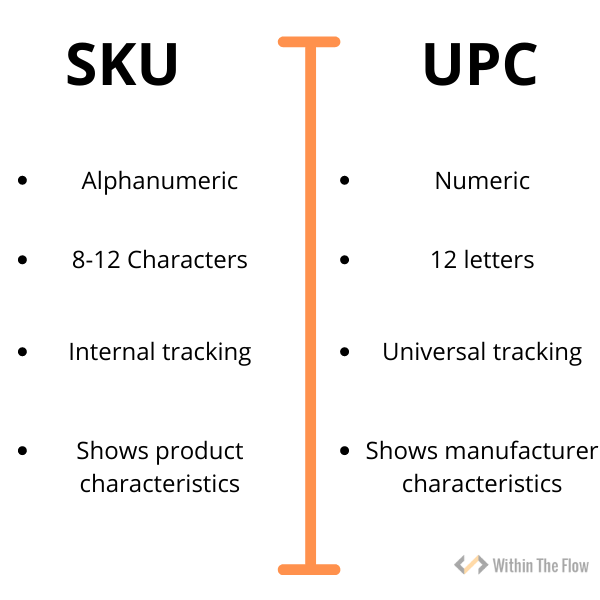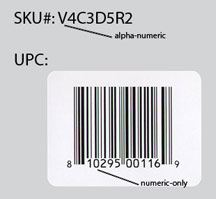What is SKU? How Does it Help in Retailing Business
- Mar-31-2020
- Bilal Uddin
- 0 comments
All those who want to start thier first retail business and planning to open up with an extensive product line either its physical store or online store, sooner or later, you must be needing SKUs.
So, those who have no idea what an SKU is, what it does, and what is the importance of SKUs; here is a brief guide.
What is an SKU?
An SKU means stock-keeping units; it is a barcode printed on different product for inventory management by automating the tracking product’s information including price, production, characteristics, size, color as well as the movement of inventory.
In simple words, SKUs help the vendor and retailer to keep track of sales to assure the profitability of the retail business.
SKUs are consist of alphanumeric usually consist of 8-12 characters combination different for each product and business.
Use of SKUs
Along with Inventory management, SKUs are very useful in creating the shopping experience comprehensive. Let’s understand it with an example
In a retail store, when a customer asks for some specific product, then the store assistant or clerk needs to look up in the storeroom and search for the particular products.
With the help of SKUs, now the retailers can quickly scan the SKU number on the product and check its different models on their point of sales software without any trouble. The use of SKU will result in excellent customer service and productivity.
How SKUs are Used
If you are planning to start an online business, either it is a brick-and-mortar store, Amazon FBA, ecommerce store, Shopify dropshipping, or Private label. You need SKUs to keep track and manage your inventory; otherwise, it would take great manual work.
Point of sales (POS) software allows the retailer to create a unique SKU for the inventory. However, you must know your need about how do you want to categorize the products depends on your tracking preference.
So, you need to specify your own needs to make a helpful SKU.
Let’s say you start a book store; then, you need to categorize the inventory based on genre (fiction or history), writers, etc. If you are selling all kinds of the genre, then it would SKU would need to further break down into categories.
Adults > Fiction > Mystery > Crime Drama
Keep the utmost requirement of your customers in mind when creating an SKU. If your customers ask the most about the model of your product, then keep that at the beginning of your SKU so you can quickly provide the required information to your customers.
SKU Best Practices
To make a useful SKU, you need to learn some best practices to make a useful SKU. The COO of Rakuten Super Logistics shares some insights about creating the methods to adopt while creating an SKU.
- Use 8-12 alphanumeric characters and make it easy enough that a fifth-grader could understand it.
- Always start SKU with a letter, do not begin with a zero or any other character that could lead to misinterpretation.
- Try making SKU that could be easily readable by humans.
- Do not use manufacturer’s SKU’s code as in these scenarios; the POS could misread your code.
- If you run a small retail store with few inventories, then avoid using SKUs.
SKU vs UPC: Stock Keeping Units vs Universal Product Codes
Stock Keeping Units is a unique product code that is created to track the inventory of a particular company. If you compare SKUs of similar products in two different retail chains, you will find the tag completely different.
Universal Product Codes (UPC), as the name suggests, is a universal identification code that are similar everywhere so that any external company can track the product with this number. This code is attached to the unique products; however, it is the same in all the retail outlets.

The significant and straightforward difference between SKU and UPC is that UPC is printed in the numeric barcode label. At the same time, SKU is present in alphanumeric that the store itself creates and prints.

The UPC is attached to the back of the product when it is made, and it remains the same until the product is on the shelf. Whereas a similar product would have different SKUs if it’s going through multiple channels such as manufacturer, wholesaler, and retailer for all three channels, there would be different SKUs but same UPC.
How Do I find my Amazon product SKU
Instead of SKU, Amazon called it ASIN – Amazon standard identification number.
You can find it on the details of the product or the product page’s URL.

How Small Business can benefit from SKUs
Increase Productivity
Inventory management operations are not an easy job. SKUs help the business owner to quickly sort and search the products with a couple of clicks. Also, it makes it easy to keep the real-time track of units.
Proactive Inventory Management Approach
SKUs help in keeping the required stock in the shelf or online store for the customer. It gives complete control over supply chain functions and provides alerts whenever a replacement of orders or reordering is required.
Boost Profits
With SKUs, you can quickly analyze which stock unit is performing well and more profitable than others so you can easily invest more in its advertisement to maximize your profits.
Gain Customers Loyalty
SKUs helps you to estimate the reordering needs. When a customer comes to your shop and could not find its desired product, you can at least update the status of out-of-stock, which helps you to gain the trust of the customer.
Wrapping Up
SKUs are undoubtedly a helpful tool to manage and organize your stock units. The more specification you enter into your SKU, the more you’ll be able to achieve success in your business.
It does work the same for everyone. Just make sure to keep the utmost requirement on the table when architect an SKU. If you think your business can run well enough without having any SKUs or you do not have enough inventory, then you can go ahead in your business manually.
